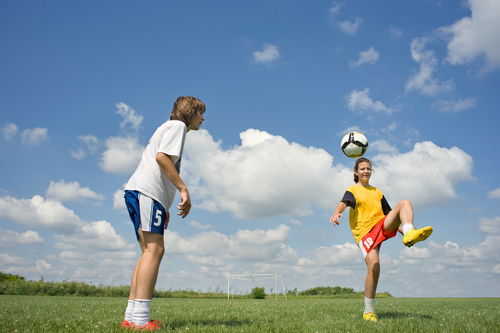
Sports injuries involving teeth are unfortunately very common. Though using a mouthguard is recommended for those who play contact sports, not all student athletes understand the importance of wearing one at all times until it’s too late. If your child loses a tooth on the sports field, don’t panic. Here are some of the most common dental injuries we see in high school athletes.
A Cracked Tooth
A fractured or cracked tooth is one of the most common sports injuries when an athlete sustains a hit to the face. The severity of the fracture varies widely depending on different factors. Athletes who do not wear mouth guards are 60 times more likely to have severe damage resulting in other long-term issues. A cracked tooth may not be visible to the naked eye unless you lose a section of the tooth enamel.
Treatment For a Cracked Tooth
Often experiencing pain when biting down or consuming hot or cold foods leads to patients thinking they have a cavity when they really have a tooth fracture. Cracked teeth can be identified during routine dental exams, which is one of the many reasons why these exams are so critical.
Depending on the damage, the tooth can be treated depending on the severity of the injury. If the damage is severe, the tooth may have to be extracted and replaced with a dental bridge or tooth implant. Trauma to an injured tooth that can be saved may require root canal treatment.
Tooth Intrusion
An intrusion occurs when the concerned tooth is driven into its socket, often due to some form of axial impact. This is a severe form of displacement injury that typically results in the damage or death of tooth nerves that have fully formed roots. If the tooth has immature root development, the intrusion will be followed by spontaneous re-eruption.
Treatment For Tooth Intrusion
Treatment should be administered as soon as possible by a dental professional as the pulp can quickly become necrotic.
Treatment may require:
- Surgery
- Splinting
- Repositioning,
- Orthodontic treatment
Knocked-Out Teeth
This is a common sports injury, and the chances of being able to save the tooth by returning it to the socket requires emergency dental treatment within one hour of the injury. If the periodontal fibers attached to the surface of the roots are still in good condition, you can recover full function. There is, on average, a 90% chance of success if the tooth is replaced in its socket within 20 minutes of the incident, with the success rate decreasing by 10% for each additional five minutes the tooth is out.
How To Treat a Knocked-out Tooth
The first thing to do is to stop all activity and find the tooth. Once the tooth has been located, pick it up and cover your hand to minimize the transfer of germs. You will need to get to an emergency dental appointment as soon as possible to save the tooth. The longer you wait, the higher the chance that the mouth can experience infection and permanent tooth loss.
While on the way to the dentist, apply a cold compress to the outside of the mouth to minimize any pain and inflammation. Avoid putting any loose ice or other frozen foods, such as popsicles, into the mouth as this could add to any discomfort. Your dental professional will be able to assess the situation upon arrival and whether the tooth can be saved successfully or not.
Unless the tooth falls out completely, keep it in your mouth, preferably in its socket, until you see a dentist.
Preventing Sports-Related Dental Injuries
Sports-related dental injuries can be successfully prevented, or the severity of the damage significantly reduced, by wearing a custom mouth guard at all times while engaging in an activity. Please discuss with your child the importance of always wearing a mouthguard while on the field, and make sure they keep up with their regular dental exams.
Don’t have a mouthguard for your athlete? Schedule an appointment with Hinsdale Dentistry today to have one custom-made.